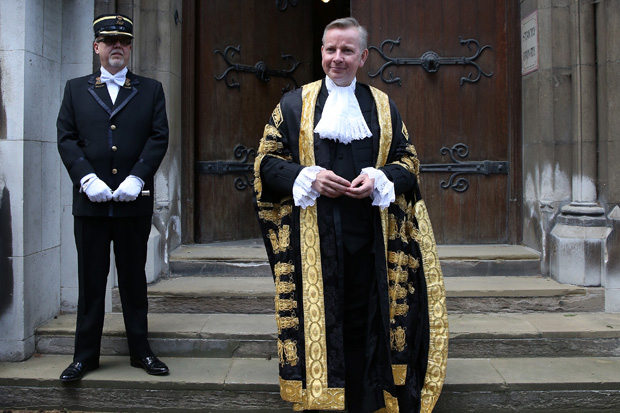A great test of political leadership is how well you deal with vested interests on your own side. In his first speech as Lord Chancellor this week, Michael Gove has shown himself willing to tackle a profession which has long been comfortable with Conservative governments and whose reform, as a consequence, is long overdue.
A legal system designed from scratch would not resemble what we have now. The only thing wrong with Michael Gove’s observation that Britain has a ‘two-nation’ justice system is that he should really have said three nations. Like the central London property market, the courts have become the preserve of the very rich and the very poor. The middle is excluded. The rich can afford to revel in the pantomime. So can the poor, thanks to the state’s largesse — albeit to a lesser extent following the coalition’s legal-aid reforms. But those who must cover their own bills, and whose pockets are not bottomless, are being edged out.
It is an irony that a legal system so apparently committed to human rights should create the unjust situation where wealthy individuals and organisations can crush their opponents not through the merits of their case but through fear of landing them with ruinous costs. Michael Gove wants wealthy legal firms to conduct, or to contribute to, more pro bono work. He also wants ponderous procedures to be improved, with greater use of technology to eliminate expensive hearings. But there is an argument for going much further and radically rethinking legal procedures.
The former Chief Justice Tom Bingham argued in his excellent book The Rule of Law that the legal system must be accessible, clear, and able to settle civil disputes affordably. And it should also apply equally to all, regardless of wealth. Such principles as these have meant that English justice is revered the world over. This, strangely, is part of the problem. The world’s super-rich resolve their disputes in English courts, and lawyers’ fees have duly soared.
As Harry Mount argued in this magazine two years ago (and as Gove argued this week), the sheer weight of this new money is corrupting. There is nothing wrong with a market in legal advice and representation, but it should not be possible to employ the most expensive legal team available and then pass on the cost to the other side. A more equitable legal system would be one in which opponents in legal cases could set a cap on the costs they can claim on the other side — and vice versa.
Michael Gove’s other great reforming battle is over the replacement of the Human Rights Act with a British Bill of Rights. The argument against this is now familiar: how will Britain in future lecture the likes of Vladimir Putin on human rights when we have opted out of the European Court of Human Rights (ECHR) and he has not? But Russia’s slide back towards dictatorship since the country ratified the European Convention on Human Rights in 1998 demonstrates the problem: the court has become bogged down with trivial cases brought by people simply using it as yet another appeal procedure when they have failed in their domestic ‘supreme’ courts. Ultimately, the ECHR has no powers to stop autocratic regimes doing what they want. Genuine human rights abuses are better dealt with through protests from powerful democracies.
What the Human Rights Act has done, however, is transfer legislative power from elected representatives to unelected judges who, using the vague principles of the Human Rights Convention, have effectively been able to rewrite laws. In a properly functioning democracy, it is Parliament which makes the laws and the courts that enforce them. That distinction has become blurred, with Parliament now ultimately subservient to activist judges in Strasbourg — many of whom come from countries whose own human rights record is poor.
Michael Gove’s appointment as Lord Chancellor has been attacked on the grounds that he has never been a practising lawyer. But that should be seen as one of his chief qualifications for the job. It is vital for the health of democracy that ministers are — and are seen to be — independent of the professions whose activities they must oversee. That is not how it has tended to be with the law. Not only has the job of Lord Chancellor always been held by a lawyer until very recently (Gove’s predecessor, Chris Grayling, was the first in 400 years not to have a legal background) but the legal profession as a whole has been over-represented in Parliament. One in every ten MPs elected since 1979 has been a barrister or solicitor, while the House of Lords is even more dominated in this way. For this reason, the law has been given preferential treatment for too long. It’s time for that to change.
Got something to add? Join the discussion and comment below.
Get 10 issues for just $10
Subscribe to The Spectator Australia today for the next 10 magazine issues, plus full online access, for just $10.
You might disagree with half of it, but you’ll enjoy reading all of it. Try your first month for free, then just $2 a week for the remainder of your first year.














Comments
Don't miss out
Join the conversation with other Spectator Australia readers. Subscribe to leave a comment.
SUBSCRIBEAlready a subscriber? Log in